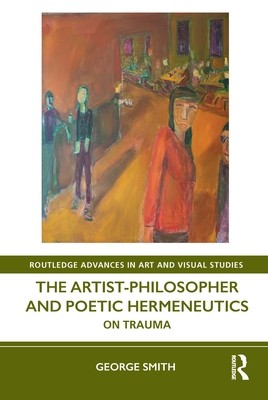
- We will send in 10–14 business days.
- Author: George Smith
- Publisher: Routledge
- ISBN-10: 0367416409
- ISBN-13: 9780367416409
- Format: 17 x 24.4 x 1.3 cm, kieti viršeliai
- Language: English
- SAVE -10% with code: EXTRA
Reviews
Description
Focusing on the aesthetic representation of trauma, George Smith outlines the nexus points between poetics and hermeneutics and shows how a particular kind of thinker, the artist-philosopher, practices interpretation in an entirely different way from traditional hermeneutics.
Taking a transhistorical and global view, Smith engages artists, writers, and thinkers from Western and non-Western periods, regions, and cultures. Thus, we see that poetic hermeneutics reconstitutes philosophy and art as hybridizations of art and science, the artist and the philosopher, subject and object. In turn, the artist-philosopher's poetic-hermeneutic reconstitution of philosophy and art is meant to transform human consciousness.
This book will be of interest to artists and scholars working in studio practice, art history, aesthetics, philosophy, cultural studies, history of ideas, history of consciousness, psychoanalytic studies, myth studies, literary studies, and creative writing.
EXTRA 10 % discount with code: EXTRA
The promotion ends in 22d.03:51:18
The discount code is valid when purchasing from 10 €. Discounts do not stack.
- Author: George Smith
- Publisher: Routledge
- ISBN-10: 0367416409
- ISBN-13: 9780367416409
- Format: 17 x 24.4 x 1.3 cm, kieti viršeliai
- Language: English English
Focusing on the aesthetic representation of trauma, George Smith outlines the nexus points between poetics and hermeneutics and shows how a particular kind of thinker, the artist-philosopher, practices interpretation in an entirely different way from traditional hermeneutics.
Taking a transhistorical and global view, Smith engages artists, writers, and thinkers from Western and non-Western periods, regions, and cultures. Thus, we see that poetic hermeneutics reconstitutes philosophy and art as hybridizations of art and science, the artist and the philosopher, subject and object. In turn, the artist-philosopher's poetic-hermeneutic reconstitution of philosophy and art is meant to transform human consciousness.
This book will be of interest to artists and scholars working in studio practice, art history, aesthetics, philosophy, cultural studies, history of ideas, history of consciousness, psychoanalytic studies, myth studies, literary studies, and creative writing.


Reviews